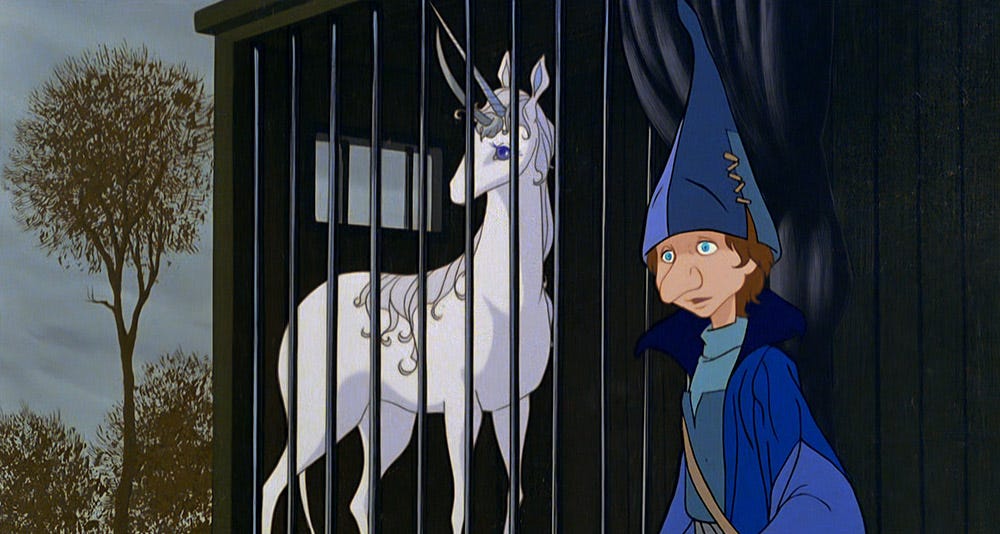I See Angels Overhead in November
Digest No. 15 - November 2024
On Commonplacing
“It’s a rare man who is taken for what he truly is,” he said. “There is much misjudgment in the world. Now I knew you for a unicorn when I first saw you, and I know that I am your friend. Yet you take me for a clown, or a clod, or a betrayer, and so must I be if you see me so. The magic on you is only magic and will vanish as soon as you are free, but the enchantment of error that you put on me I must wear forever in your eyes. We are not always what we seem, and hardly ever what we dream.”
Peter S. Beagle, The Last Unicorn (New York: ACE Publishing, 1968), pp. 52.
Great Ideas: Man, Judgement, Change, Fate
We’re reading through Beagle’s The Last Unicorn as a family, and I’m always struck by different lines from the book each time I read it. I’m hoping to read through Beagle’s The Way Home after this. On this read, I’ve been most interested in Schmendrick the Magician’s character. And the above line sort of reoriented me towards him early on. He is more than a comedic relief in a fairly serious story; Schmendrick might be a stand in for anyone who lives in the real world, but knows there is something more than the real world.
My youngest child, our only girl, wasn’t very interested until the arrival of Lady Amalthea in the second half of the book. But she has been hooked ever since, exclaiming aloud at the end of each chapter, “what will happen next?!” I’m sure Beagle would be satisfied with that response.
On Reading & Researching & Teaching
Leading teachers through various great works has been great. I’m thankful for an organization like Thales College which makes a program like the Certificate in Classical Education Philosophy available. The Classical Anthropology course, we’ve worked our way through Russell Kirk’s Enemies of the Permanent Things and will wrap up with Richard Weaver’s Ideas Have Consequences in a couple of weeks. And over in the Humanities Core Texts class, we’ve finished Genesis and Homer’s Odyssey. We’ll conclude the class with Dante’s Inferno.
This represents the bulk of my reading for the month, though I’ve managed to work in Mass Effect Andromeda: Nexus Uprising. This struck me as much better written than the first three Mass Effect novels, and offering a much better backstory for the game. The struggle with the original trilogy was that the three games had so thoroughly explored the characters, there were limitations on what they could do. Andromeda, by contrast, left open huge holes in characters, plots, and other story points that the novels really seem to have a a lot of room to work. I hope this proves true for the remaining stories.
I’ve also begun submitting work for my MA in Character Education with the University of Birmingham. The British system is very different than my experience here in the U. S., but I’m not complaining. I am hoping to work all my individual essays together towards the Master’s dissertation, which will focus on Classical Education. Who knows what the future of that work will be?
On Writing & Publishing
I’ve had the great pleasure of connecting with quite a few folks over the recent weeks. I’ve met a handful of folks from Arcadia Education, and I look forward to some of the Lab’s work with them in the future, even if I’m not around for much of it. Since my time at the University of Arkansas is up at the end of June, there’s a lot that will likely still be ongoing when I depart Fayetteville.
One thing that should be solidly complete is the parent response to grades project that I’ve been working on for what feels like forever. The essay itself is basically finished, and we think we may have found a publisher. A series of books on classical education are being published over the next couple of years, and the third volume of this planned series would be a good home for the Lab’s work on grading. These should be practitioner oriented books, finding homes on classroom shelves and on the desks of educators. That was one of the primary concerns with the project, namely, finding a way to make it helpful and accessible to people actually in the classroom.
I have several projects due at the first of the year as well, which will be a focal point over the coming months.
On Traveling & Speaking
November has been a slow month in terms of traveling, which I’m grateful for coming off October’s schedule. We traveled to Florida for the Thanksgiving holiday, which coincided with my aunt and uncle’s 50th wedding anniversary. While on the road, I did enjoy a great conversation with Josh Herring over at The Optimistic Curmudgeon. A couple of us joined him to discuss Alex Petkas’s “Great Books are for Losers” essay. I came away from the essay considering a bit of provocation rather than a serious argument. But it was still fun to chat with others about why the Great Books approach has merit for education. Once the episode is made available, I will link it here.
On Listening
I’m very late to the Brooks & Dunn Reboot versions of their songs. This one with Luke Combs has become a fast favorite in our home.





